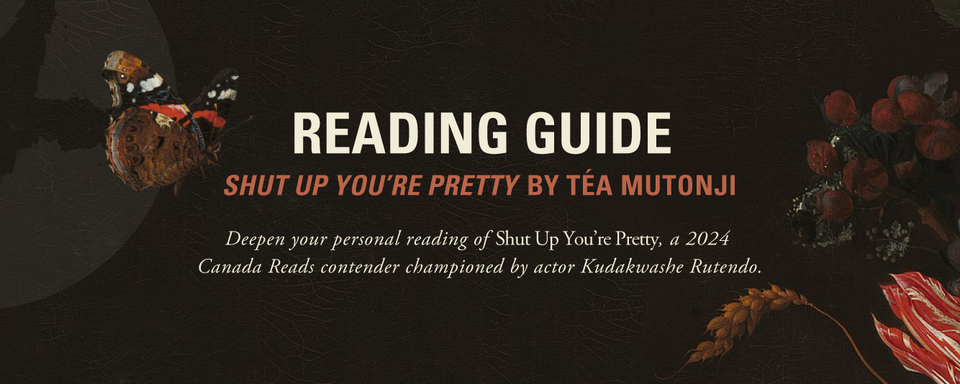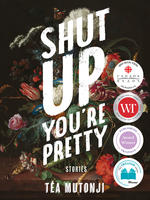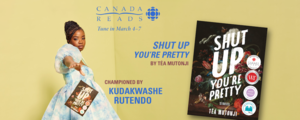
Reading guide: "Shut Up You're Pretty" by Téa Mutonji
Reading guide: Shut Up You’re Pretty
These discussion questions can be used to generate dialogue in your book club, literature class, or reading challenge group and/or to deepen your own personal reading of Shut Up You’re Pretty by Téa Mutonji.
—
Questions
1. Did you know anything about Shut Up You’re Pretty author Téa Mutonji or Vivek Shraya’s VS. Books imprint before you began reading these stories? How did knowing (or not knowing) about the book affect or shape your expectations?
2. The book’s title, Shut Up You’re Pretty, has no punctuation, which encourages the reader to speak it like a statement. How does the title relate to the themes—alienation, sexuality, objectification, grief, and girlhood—explored in this collection?
3. Each short story in Shut Up You’re Pretty is self-contained; stories can be read one at a time without reading the ones that follow or come before. At the same time, the collection has a central character in Loli, who appears at various moments in her life, from the ages of six to twenty-six. Did you enjoy this structure, which some might call novella-like? Why or why not?
4. The stories in Shut Up Your Pretty depict a variety of relationships—intimate (with the self), romantic, platonic, familial, as well as cultural and societal—throughout Loli’s girlhood into her young womanhood. Some examples from the stories include Loli’s friendships with other girls, the connection (or disconnection) between Loli and her mother, how Loli’s broader community experiences grief, and Loli's own relationship to sexuality and desire. What do the stories in this collection have to say about how girls and young women relate to themselves, each other, and the world?
5. What is your favourite story in the collection Shut Up You’re Pretty, and why?
6. Multiple reviewers have praised Shut Up You’re Pretty for its realism, with one critic noting that Loli’s inner monologue captures the “din and insecurity that is growing up.” Did the book resonate with you as realistic? Why or why not?
7. Do you consider Shut Up You’re Pretty a coming-of-age story collection? Coming-of-age fiction is concerned with the development and growth of a protagonist (physical, spiritual, moral) from childhood into teenage or adult years. (It’s also called formative-age fiction and, depending on how much of a stickler you are about structure, bildungsroman.) Some famous coming-of-age books include To Kill a Mockingbird by Harper Lee (1960), Blackbird by Larry Duplechan (1986), and Sing, Unburied, Sing by Jesmyn Ward (2017). Does Shut Up You’re Pretty meet, subvert, or change your expectations of this class of fiction? What do we gain (or compromise) by reading the stories through this framing?
8. Shut Up You’re Pretty author Téa Mutonji has shared in interviews that it was important to her, in writing the character of Loli, that she wasn’t easily stereotyped or labelled as any one thing. Did Loli defy your expectations? Did any of her actions or reactions surprise you? Why or why not?
9. Shut Up You’re Pretty takes place in Scarborough, Ontario, specifically in the suburb of Galloway. Is this setting familiar to you? Did locations and descriptions of the characters’ environments make an impression on you while you were reading? How important is setting to you as a reader?
10. The prose in Shut Up You’re Pretty might be described as rhythmic and driving. Did any music come to mind for you while reading the book? If you were to create a soundtrack to the book (or to a specific story), what artist(s) or song(s) would you feature?
11. Do you think Shut Up You’re Pretty would adapt well to another media format (theatre, television, movie, radio)? If yes, what format would you choose? Who would you cast to play Loli and Joli? Who would you want to see adapt the book?
12. Did you highlight, underline, or bookmark any particular lines, passages, or stories in Shut Up You’re Pretty? Share the line, passage, or story and explain why it captured your imagination.
13. Would you recommend Shut Up You’re Pretty to other readers? If yes, how would you describe the book and your experience of reading it? Are there other books, films, or any other texts that remind you of Shut Up You’re Pretty?
—
Does your library, literary festival, or professional organization run a book club that hosts author talks? Shut Up You’re Pretty author Téa Mutonji and VS. Books imprint founder and editor Vivek Shraya may be available for (paid) virtual appearances.
Please contact Cynara Geissler (Director of Marketing and Publicity, Arsenal Pulp Press) at marketing@arsenalpulp.com for more information.
—
VS. Books, an imprint of Arsenal Pulp Press ● vsbooks.ca
All rights reserved. Copyright © 2024 by Arsenal Pulp Press.
For more information, contact marketing@arsenalpulp.com


